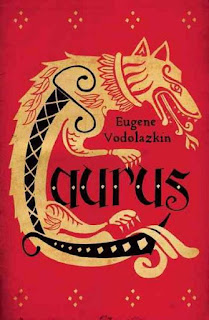Eugene Vodolazkin did not expect anyone except his wife and his immediate, curious colleagues to read his novel 'Laurus', set in fifteenth-century Russia, describing the life of a healer, holy fool, pilgrim, and monk yet, to his surprise, it not only won awards but became a best seller in its native Russia and is now in the process of appearing in no less than fifteen languages. The English version, which I read, faithfully translates Vodolazkin's blend of archaic and contemporary language as it seeks both to recreate it's past' 'lifeworld' and simultaneously undermine your sense of time itself.
This is a hugely ambitious novel in which we follow Arseny, the grandson of a healer, through four distinct phases of his life, each one with its own setting and place. The accomplished healer succumbs to a deranging melancholy on the death of his beloved (and of his child) in childbirth and takes on the mantle of a 'holy fool'. The fool, in turn, becomes a pilgrim to Jerusalem and on his return to Russia, a monk. In each guise, he seeks not his own redemption but that of his wife and child. The expiation of his sins focuses on earning an afterlife for them that is blessed, in which their names and faces are known to and in God.
Through each life, we are introduced to a detailed picture of what such a life might look like and into the worlds of those with whom Arseny interacts. We see the faith invested in folk medicine, even when it fails to work, suggestive of a world created for man even if, in its Fall, it is far from always beneficent. We see the workings of the plague. We see the strange admixture of admiration for holiness slipping into its violating opposite - the demands of holiness can be difficult to bear for the unholy- so they punish it. We see the comforts of a communal world and its dangers when it encounters the stranger or simply the estranged.
Each phase of life for Arseny brings him a new name ending in the monastic name of Laurus. Each phase of life brings speculation as to what it is in us that maintains a continuity of life and is that continuity of our personal stories or yet something other perhaps in Arseny's case his binding commitment to his beloved and his faith in God's ability to grant her a restful home.
If this was 'all' the novel contained it would be an elegant sufficiency but there is another, deepening strand that runs through the text, gathering pace, and that is its questioning the nature of time. Arseny acquires (and loses) in the second half an Italian friend, Ambrogio, who visits Russia because it is friendly to prophesy and Ambrogio, through a glass darkly, sees the future and is puzzled for he has seen that in 1492 a new world will be discovered but too that (in Russia) the end of the world is expected. Both cannot be true (at least literally). Ambrogio's character allows Vodolazkin to unfurl speculations on time - its subjective changes of pace, the ability to stand outside of it, the thought that it is fundamentally unreal: everything simply is present in an eternal instantiation to which having, imperfect access, one can, from time to time, see effectively into the future (and presumably the past). And so on and so forth.
This speculative undercurrent too places a question mark over the whole because at one level the text can, and is, read as the faithful rendering of Arseny's multiple lives that inhabit not only a historically authentic frame but also one undoubtedly inspired by the Orthodox faith of the author.
As one, enthusiastic reviewer in the American Conservative put it, the book can inspire you to pray (and it does). Indeed it might even help you unravel that mysterious 'object' the Russian soul and have you yearning for Holy Mother Russia reinvigorated (which would show, sadly, that fantasy trumps anything proximate to historical reality).
But how 'Orthodox' is the novel in practice?
Foreseeing the future in an instantaneous present places strains on traditional defenses of free will. Meanwhile, Arseny seems strangely uninterested in Christ (for a holy fool or a pilgrim or a monk) even though Christ does appear briefly, in vision, and make a crucial intervention in Jerusalem. Finally, none of his spiritual mentors/companions seem to challenge, Arseny's strangely morbid fixation on redeeming his beloved. This seems to occlude (until the final recapitulating moments) any true surrender of self: his guilt is subtly too fascinating.
This may, ultimately, of course, be its primary orthodox point. We are redeemed only through passing through time, and all its messiness, to an elsewhere that is timeless. Both namely having and inhabiting a history and then losing our history are essential to becoming fully human and thus an image of God. It is by entering that paradox fully that we find our life and the connecting thread of our multiple selves.

Comments
Post a Comment